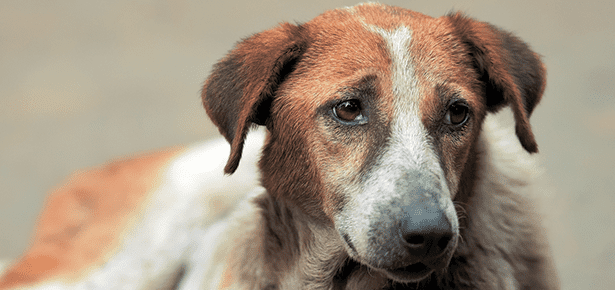Here are the top signs of cancer you can look for, according to the American Veterinary Medical Association and the Veterinary Cancer Society. These don’t always indicate cancer but even if the condition turns out not to be cancer, these signs may be signaling another medical condition that needs veterinary attention. Also, it is critical to remember that a pet can be very sick “inside,” without showing any of the signs “outside”, which is we recommend regular veterinary exams and bloodwork, at least once a year. Early detection is key when dealing with cancer, when treatment is more effective and less costly.
- Abnormal swellings that persist or continue to grow –
Skin cancers are one of the more common types. The most obvious sign is a mass (or bump, or lump) that keeps growing in or under the skin. Any lump over ½ inch in diameter ought to be examined and possibly biopsied. - Sores that do not heal –
These soresare typically skin wounds that don’t seem to heal despite antibiotics by mouth or an ointment applied locally. This also applies to no-healing wounds near a nail. - Weight loss –
This means unexplained weight lossthat can’t be explained by a weight-loss diet. Common causes could include a tumor along the intestine. - Loss of appetite –
Similarly, a mass pushing along the intestines may make your dog feel bad. One of the first things a pet will then do is stop eating. - Difficulty eating or swallowing –
A lump in the neck could be putting pressure on the esophagus (the tube between the mouth and the stomach). - Bleeding or discharge from any body opening –
Although bleedingfrom the nose does not necessarily mean cancer, is certainly a common sign of cancer of the nose. - Offensive odor
- Reluctance to exercise or loss of stamina
- Persistent lameness or stiffness –
We see lame pets every single day, but luckily they rarely have cancer! However, bonecancer can cause pain and lameness, along with swelling along the leg. - Difficulty breathing, urinating or defecating –
This could be due to a mass putting pressure on the respiratory system (wind pipe, lung), urinary system (bladder, urethra) or digestive system (rectum, anus). - Change in urination or defecation habits
Remember that cancer is not always fatal. There are treatment options for many different types of cancer. Some can be cured with surgery. Others can be managed for extended periods of time with medication. The key to successful outcomes is early detection and treatment.
